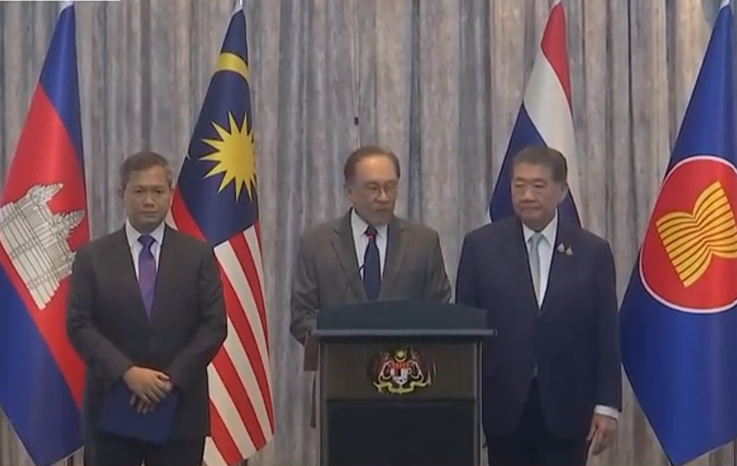PUTRAJAYA / BANGKOK / PHNOM PENH — After five days of deadly cross-border fighting that has left at least 36 people dead and displaced more than 270,000, the governments of Thailand and Cambodia agreed to an unconditional ceasefire set to take effect at midnight, Monday, July 28.
The agreement was reached during emergency talks hosted by Malaysian Prime Minister Anwar Ibrahim in Putrajaya. Acting Thai Prime Minister Phumtham Wechayachai and Cambodian Prime Minister Hun Manet jointly committed to halting military action and beginning a new diplomatic process to resolve their longstanding territorial dispute.
“This is a vital first step towards de-escalation and the restoration of peace and security,” Anwar told the media following the meeting. “We commend both leaders for prioritising dialogue over further conflict.”
Background: Decades-Old Dispute Reignited
The recent flare-up, the most severe in more than a decade, began on July 24 amid escalating tensions that had been simmering since May. The root of the conflict lies in contested interpretations of colonial-era maps and the control of culturally significant sites such as the Prasat Ta Moan Thom temple near the border.
Hostilities intensified after a Cambodian soldier was killed in May during a minor border confrontation. In February, tensions rose further when Thai police barred Cambodian tourists from singing their national anthem at the disputed temple, sparking nationalist outrage on both sides.
Over the past five days, artillery exchanges and ground skirmishes have been reported along multiple sectors of the 817-kilometre (508-mile) border, particularly near Thailand’s Surin Province and Cambodia’s Oddar Meanchey. The Thai Interior Ministry reported that more than 138,000 Thai residents have been evacuated since January; Cambodian media reported over 20,000 displaced on their side.
Ceasefire Terms and Next Steps
According to the joint statement released after the talks, the defence ministers of all three countries — Malaysia, Thailand, and Cambodia — have been tasked with developing a comprehensive ceasefire mechanism, including verification and monitoring procedures.
A meeting of the General Border Committee (GBC), comprising senior military officials from both nations, is scheduled for August 4 in Cambodia to establish long-term protocols for managing the border and preventing further clashes.
Prime Minister Hun Manet expressed cautious optimism:
“We have a very good meeting and very good results … We hope that the solutions announced today will pave the way for a return to normalcy and future de-escalation.”
Meanwhile, Thai acting PM Phumtham, who had previously expressed doubts about Cambodia’s sincerity, acknowledged the fragility of the truce:
“We hope this ceasefire will be implemented in good faith by both sides.”
Ongoing Clashes and Regional Response
Despite the ceasefire announcement, sporadic fighting was still reported late Monday along parts of the border. Al Jazeera’s Tony Cheng, reporting from Surin Province, described a tense situation on the ground, with displaced families desperately hoping for a return to safety. “There are so many people who have been affected by this, and they just want to go home so badly,” he said.
ASEAN observers welcomed Malaysia’s mediation role, though some analysts remain sceptical about the ceasefire’s durability without independent monitoring. Local and international media noted that no external observers or verification mission has yet been confirmed.
Broader Implications and Outlook
The shortened format of the talks — originally scheduled for two days but reduced to one — has drawn attention to the underlying political and strategic rifts between the two Southeast Asian neighbours. Observers say deeper geopolitical differences, including Thailand’s domestic political uncertainty and Cambodia’s assertive border posture, could resurface if confidence-building measures fail.
While the ceasefire marks a significant de-escalation, questions remain about the sustainability of peace and the potential for future flare-ups. Analysts urge both sides to prioritize transparency and confidence-building in upcoming military-to-military talks.
As one Thai commentator noted in The Nation: “This agreement is a necessary pause, not a resolution. Without structural dialogue and third-party facilitation, the road to peace remains uncertain.”
For now, the ceasefire offers a reprieve for thousands of civilians caught in the crossfire — but the long-term solution will depend on mutual trust, political will, and concrete actions. (zai)

